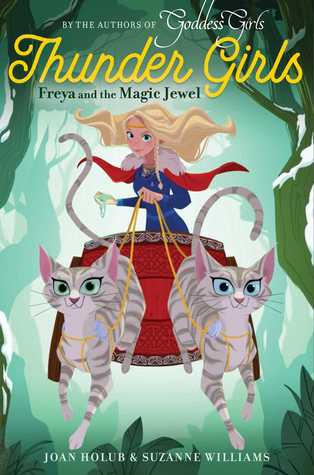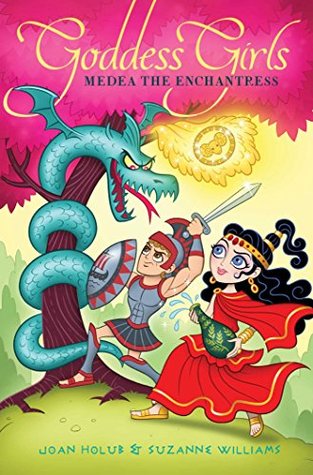 Holub, Joan and Williams Suzanne. Freya and the Magic Jewel (Thunder Girls #1)
Holub, Joan and Williams Suzanne. Freya and the Magic Jewel (Thunder Girls #1)May 1st 2018 by Aladdin
Copy provided by the authors
Freya is all set to start the new school year in Vanaheim as student body president and super-popular giel, so is a bit distraught when she is told that she and her twin brother, Frey, are being sent to Asgard Academy. They are invited personally by Odin, who is hoping to restore peace to the Nine Worlds after the war between the Aesir and the Vanir. There really isn't any choice, so she and Frey pack up their belongings and make the long trek to Asgard. Freya has some magical powers, but they are all tied to a jewel she carries called Brising. As she is entering the school grounds, the jewel slips from her grasp and is stolen by the dwarfs in Darkalfheim. She doesn't want anyone to know, especially since Odin and Mrs. Frigg call her to the office the very first day to meet with her. Freya's days are busy with all of her new friends, and she meets other gods like Loki, who is never up to any good. Her roommates are all supportive, but it is hard getting used to a new school, living with giants (even if they normally shrink themselves down), and dealing with the adoration of so many boys. Can Freya manage to get her jewel back and have a successful career at Asgard Academy with her group of Thunder girls?
Strengths: Freya has a positive attitude even though she doesn't want to go to a whole new world. She manages to make friends even while dealing with the loss of her jewel. The mythology is well explained, and the gods and goddesses true to the original portrayals, with a middle grade friendly twist. The covers are bright and colorful, so these will sell themselves to young readers who like magic or fairy stories, and can never have a series long enough to suit them.
Weaknesses: I like my mythology told in a more serious way, but my readers will enjoy the fashion and frivolity.
What I really think: I have a good collection of Greek and Roman mythology books, but struggle to find Norse titles, so will probably purchase this series.
 Holub, Joan and Williams Suzanne. Medea the Enchantress (Goddess Girls Book 23)
Holub, Joan and Williams Suzanne. Medea the Enchantress (Goddess Girls Book 23) Published December 5th 2017 by Aladdin
Copy provided by the authors
When this series debuted in 2010, I had a language arts teacher who was very interested in mythology, and required students to read books set in Greece and Rome. The preference of my students at the time was for more serious stuff-- Jane Yolen's Young Heroes, McCaughrean's retellings, and Cadnum's Starfall and Nightsong. Now that I have a lot of readers who prefer somewhat younger titles, it's daunting to think about spending $350 to get the series in hardcovers of $300 to get it in Follett Bound! Book 23 is still fairly new, so take a look and see if your collection is up to date! I do have to say that one of my students was thrilled to get the paperback, as she had read all of the books!
From Goodreads:
Princess Medea and a boy named Jason go on a quest for the Golden Fleece in this twenty-third Goddess Girls adventure!
Jason and Princess Medea are on a quest for the golden fleece, a symbol of kingship, that’s hanging from a limb of the great oak tree. But a huge sleeping serpent guards the fleece—and is the one (scary!) barrier for Jason and Medea. With the help of a special sleeping potion Medea creates, can Medea and Jason work their magic and take what is rightfully theirs?

Hardy, Ralph. Argos:The Story of Odysseus as Told by His Loyal Dog
March 27th 2018 by HarperCollins (first published May 31st 2016)
Paperback provided by Media Masters Publicity
I forgot that I had read this one! A paperback version is a great idea for die-hard fantasy fans who want something to take on a trip!
Argos is Odysseus' loyal dog, who was also called Boar Slayer, since he was the only survivor of a boar attack that killed his mother and littler mates. When his master goes off to fight in the Trojan war, Argos stays behind to protect Penelope and the young Telemachus. After the war is over, Argos gets news of Odysseus' escapades on his return home from a variety of creatures who relay them to him. This way, the reader gets to see the events of the Odyssey in relationship to the occurrences back in Ithaka. Argos fears for his master's safety but is powerless to do anything; he also can't help Penelope as much as he would like. Once Odysseus finally makes his way home, Argos lays down his weary burden, so Odysseus is aided in his difficult return to his home by Argos' son, Leander.
This is a very clever way to retell the Odyssey for today's readers, and I think that this is a great example of Homeric tradition-- tell the same story, but add a new and unique twist on it. I've always thought it was a little odd that Odysseus' story is told mostly in flashbacks, so this is a great way to lay out the timelines of both Odysseus and Penelope so we can understand how they occurred together.
Argos is a figure who has a small but significant role in the original story, but even though his appearance is brief, it definitely captures the imagination. Did the dog really live for over 20 years, waiting patiently for his master? It's interesting to see the intrusion of the suitors from Argos' point of view, and Telemachus also becomes more of a fully fleshed character when shown interacting with Argos.
Hardy definitely clearly loves this story and has studied the various translations of the Odyssey and remains true to the original story. For high school readers who are offered a watered down version of The Odyssey in a literature textbook, this will provide more details in an interesting fashion. There are so few books set in ancient Greece that readers who crave books set during this period will pick this up avidly.
At almost 400 pages, this is a bit long, and the pacing is a bit slow. The prose is oddly stilted and outdated. (page 87, ARC- "This did Eurylochos see with amazement, and then he stealithy crept back along the trail toward the black ship... But when he arrived, so great was his grief and despair that he could not speak, but only cry out in lamentations for many hours.") I've read the Odyssey in Greek, and I know how easy it is to fall into the trap of making one's translation sound like something written in the 1800s, but I wish Hardy had managed to avoid this!

























You know Greek as well as Latin! That's very impressive. No wonder we made you an Honorary Guy!
ReplyDelete